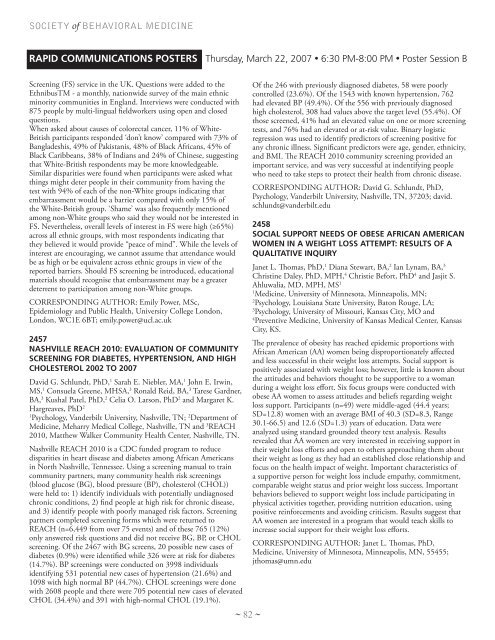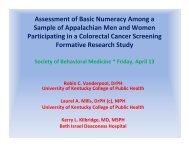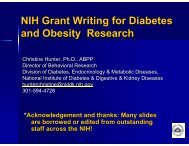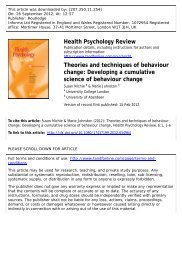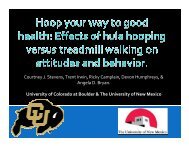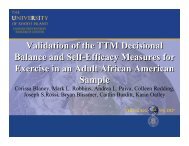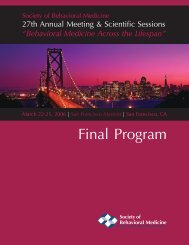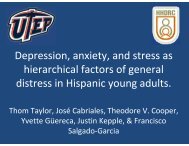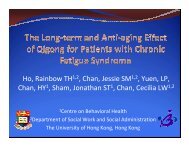2007 Final Program - Society of Behavioral Medicine
2007 Final Program - Society of Behavioral Medicine
2007 Final Program - Society of Behavioral Medicine
Create successful ePaper yourself
Turn your PDF publications into a flip-book with our unique Google optimized e-Paper software.
SOCIETY <strong>of</strong> BEHAVIORAL MEDICINE<br />
Rapid Communications Posters Thursday, March 22, <strong>2007</strong> • 6:30 PM-8:00 PM • Poster Session B<br />
Screening (FS) service in the UK. Questions were added to the<br />
EthnibusTM - a monthly, nationwide survey <strong>of</strong> the main ethnic<br />
minority communities in England. Interviews were conducted with<br />
875 people by multi-lingual fieldworkers using open and closed<br />
questions.<br />
When asked about causes <strong>of</strong> colorectal cancer, 11% <strong>of</strong> White-<br />
British participants responded ‘don’t know’ compared with 73% <strong>of</strong><br />
Bangladeshis, 49% <strong>of</strong> Pakistanis, 48% <strong>of</strong> Black Africans, 45% <strong>of</strong><br />
Black Caribbeans, 38% <strong>of</strong> Indians and 24% <strong>of</strong> Chinese, suggesting<br />
that White-British respondents may be more knowledgeable.<br />
Similar disparities were found when participants were asked what<br />
things might deter people in their community from having the<br />
test with 94% <strong>of</strong> each <strong>of</strong> the non-White groups indicating that<br />
embarrassment would be a barrier compared with only 15% <strong>of</strong><br />
the White-British group. ‘Shame’ was also frequently mentioned<br />
among non-White groups who said they would not be interested in<br />
FS. Nevertheless, overall levels <strong>of</strong> interest in FS were high (≥65%)<br />
across all ethnic groups, with most respondents indicating that<br />
they believed it would provide “peace <strong>of</strong> mind”. While the levels <strong>of</strong><br />
interest are encouraging, we cannot assume that attendance would<br />
be as high or be equivalent across ethnic groups in view <strong>of</strong> the<br />
reported barriers. Should FS screening be introduced, educational<br />
materials should recognise that embarrassment may be a greater<br />
deterrent to participation among non-White groups.<br />
CORRESPONDING AUTHOR: Emily Power, MSc,<br />
Epidemiology and Public Health, University College London,<br />
London, WC1E 6BT; emily.power@ucl.ac.uk<br />
2457<br />
NASHVILLE REACH 2010: EVALUATION OF COMMUNITY<br />
SCREENING FOR DIABETES, HYPERTENSION, AND HIGH<br />
CHOLESTEROL 2002 TO <strong>2007</strong><br />
David G. Schlundt, PhD, 1 Sarah E. Niebler, MA, 1 John E. Irwin,<br />
MS, 1 Consuela Greene, MHSA, 3 Ronald Reid, BA, 3 Tarese Gardner,<br />
BA, 3 Kushal Patel, PhD, 2 Celia O. Larson, PhD 2 and Margaret K.<br />
Hargreaves, PhD 2<br />
1<br />
Psychology, Vanderbilt University, Nashville, TN; 2 Department <strong>of</strong><br />
<strong>Medicine</strong>, Meharry Medical College, Nashville, TN and 3 REACH<br />
2010, Matthew Walker Community Health Center, Nashville, TN.<br />
Nashville REACH 2010 is a CDC funded program to reduce<br />
disparities in heart disease and diabetes among African Americans<br />
in North Nashville, Tennessee. Using a screening manual to train<br />
community partners, many community health risk screenings<br />
(blood glucose (BG), blood pressure (BP), cholesterol (CHOL))<br />
were held to: 1) identify individuals with potentially undiagnosed<br />
chronic conditions, 2) find people at high risk for chronic disease,<br />
and 3) identify people with poorly managed risk factors. Screening<br />
partners completed screening forms which were returned to<br />
REACH (n=6,449 from over 75 events) and <strong>of</strong> these 765 (12%)<br />
only answered risk questions and did not receive BG, BP, or CHOL<br />
screening. Of the 2467 with BG screens, 20 possible new cases <strong>of</strong><br />
diabetes (0.9%) were identified while 326 were at risk for diabetes<br />
(14.7%). BP screenings were conducted on 3998 individuals<br />
identifying 531 potential new cases <strong>of</strong> hypertension (21.6%) and<br />
1098 with high normal BP (44.7%). CHOL screenings were done<br />
with 2608 people and there were 705 potential new cases <strong>of</strong> elevated<br />
CHOL (34.4%) and 391 with high-normal CHOL (19.1%).<br />
~ 82 ~<br />
Of the 246 with previously diagnosed diabetes, 58 were poorly<br />
controlled (23.6%). Of the 1543 with known hypertension, 762<br />
had elevated BP (49.4%). Of the 556 with previously diagnosed<br />
high cholesterol, 308 had values above the target level (55.4%). Of<br />
those screened, 41% had an elevated value on one or more screening<br />
tests, and 76% had an elevated or at-risk value. Binary logistic<br />
regression was used to identify predictors <strong>of</strong> screening positive for<br />
any chronic illness. Significant predictors were age, gender, ethnicity,<br />
and BMI. The REACH 2010 community screening provided an<br />
important service, and was very successful at indentifying people<br />
who need to take steps to protect their health from chronic disease.<br />
CORRESPONDING AUTHOR: David G. Schlundt, PhD,<br />
Psychology, Vanderbilt University, Nashville, TN, 37203; david.<br />
schlundt@vanderbilt.edu<br />
2458<br />
SOCIAL SUPPORT NEEDS OF OBESE AFRICAN AMERICAN<br />
WOMEN IN A WEIGHT LOSS ATTEMPT: RESULTS OF A<br />
QUALITATIVE INQUIRY<br />
Janet L. Thomas, PhD, 1 Diana Stewart, BA, 2 Ian Lynam, BA, 3<br />
Christine Daley, PhD, MPH, 4 Christie Befort, PhD 4 and Jasjit S.<br />
Ahluwalia, MD, MPH, MS 1<br />
1<br />
<strong>Medicine</strong>, University <strong>of</strong> Minnesota, Minneapolis, MN;<br />
2<br />
Psychology, Louisiana State University, Baton Rouge, LA;<br />
3<br />
Psychology, University <strong>of</strong> Missouri, Kansas City, MO and<br />
4<br />
Preventive <strong>Medicine</strong>, University <strong>of</strong> Kansas Medical Center, Kansas<br />
City, KS.<br />
The prevalence <strong>of</strong> obesity has reached epidemic proportions with<br />
African American (AA) women being disproportionately affected<br />
and less successful in their weight loss attempts. Social support is<br />
positively associated with weight loss; however, little is known about<br />
the attitudes and behaviors thought to be supportive to a woman<br />
during a weight loss effort. Six focus groups were conducted with<br />
obese AA women to assess attitudes and beliefs regarding weight<br />
loss support. Participants (n=49) were middle-aged (44.4 years;<br />
SD=12.8) women with an average BMI <strong>of</strong> 40.3 (SD=8.3, Range<br />
30.1-66.5) and 12.6 (SD=1.3) years <strong>of</strong> education. Data were<br />
analyzed using standard grounded theory text analysis. Results<br />
revealed that AA women are very interested in receiving support in<br />
their weight loss efforts and open to others approaching them about<br />
their weight as long as they had an established close relationship and<br />
focus on the health impact <strong>of</strong> weight. Important characteristics <strong>of</strong><br />
a supportive person for weight loss include empathy, commitment,<br />
comparable weight status and prior weight loss success. Important<br />
behaviors believed to support weight loss include participating in<br />
physical activities together, providing nutrition education, using<br />
positive reinforcements and avoiding criticism. Results suggest that<br />
AA women are interested in a program that would teach skills to<br />
increase social support for their weight loss efforts.<br />
CORRESPONDING AUTHOR: Janet L. Thomas, PhD,<br />
<strong>Medicine</strong>, University <strong>of</strong> Minnesota, Minneapolis, MN, 55455;<br />
jthomas@umn.edu


